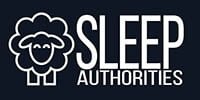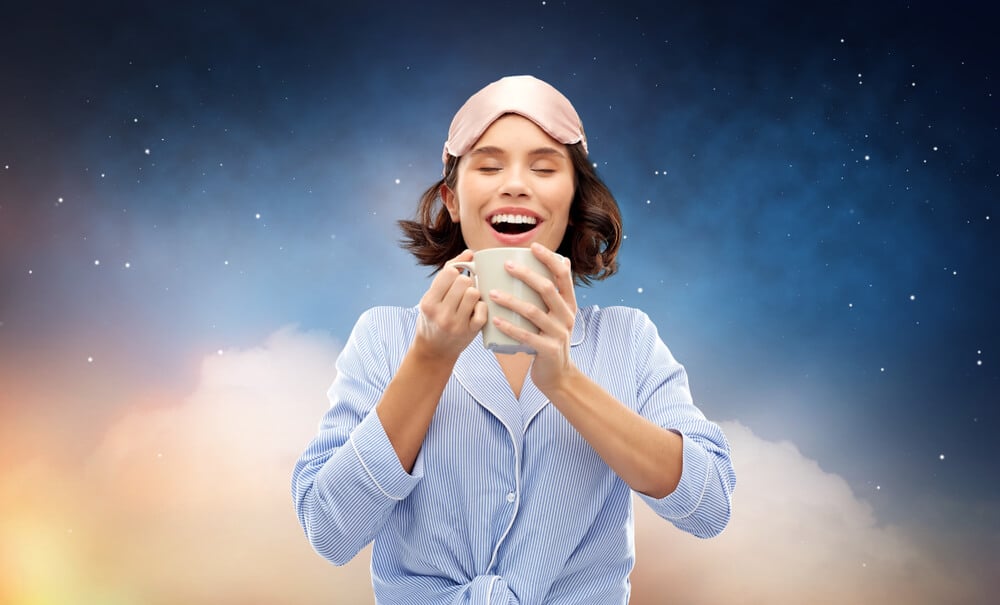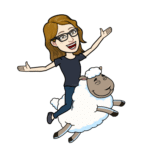Tea is the most popular beverage in the world after water.[1] It’s not hard to see why, either. Besides being delicious, many claim that herbal blends offer health benefits. Drinking tea for sleep, especially, is incredibly popular.
But does drinking tea for health actually work?
To answer that question, we’re taking a look at some of the most popular teas for sleep and what science says about their effectiveness.
If you feel like you’re having trouble sleeping, take our insomnia quiz.
9 Herbal Teas for Sleep
Which tea is best for sleep? While the answer to that question will vary by individual, some popular teas made of potentially sedative herbs include:
Chamomile
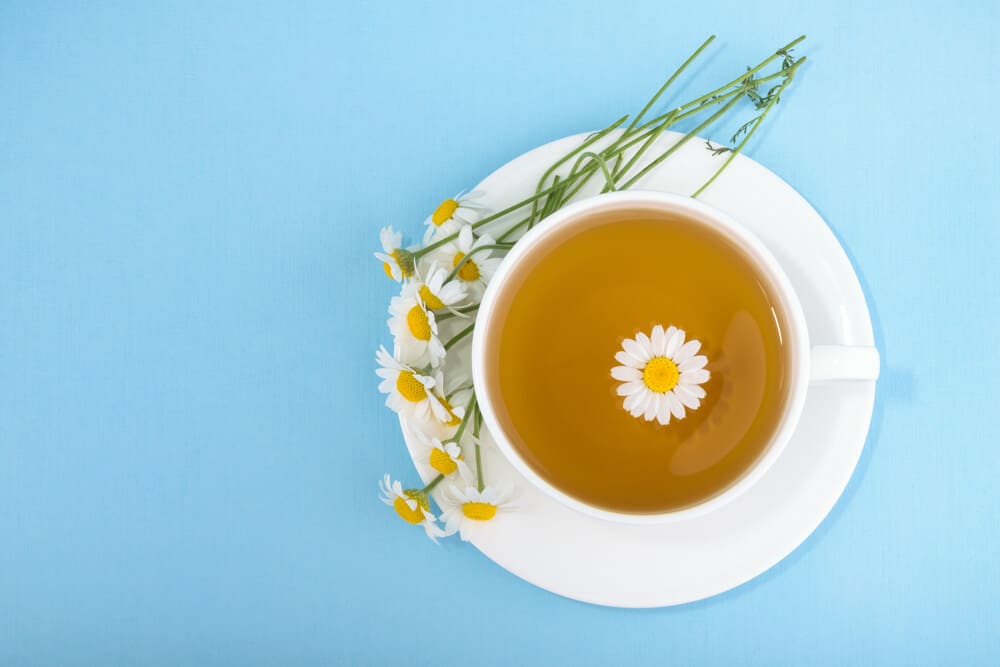
Chamomile has a long history of use in herbal remedies, and the flowers of this plant are still a popular source of tea today. The beverage will most likely be made of either the German (Matricaria recutita) or Roman (Chamaemelum nobile) species of this plant family.
What are the Benefits of Chamomile?
Besides potentially improving sleep, why else do people use chamomile? Primarily, many ingest it in the hopes it will aid with digestive issues or menstrual pain. It’s also common for people to apply it to their skin for symptomatic relief of conditions like eczema.
What are the Side Effects of Chamomile?
Chamomile is related to the ragweed, a plant notorious for inducing allergic reactions. So, people who have previously experienced allergic reactions to ragweed or similar plants should steer clear of this flower. Pregnant individuals should likewise avoid Roman chamomile, as it may cause miscarriages.
Does Chamomile Tea for Sleep Work?
Chamomile tea may help with sleep issues. However, there is still not enough concrete scientific evidence to say definitively if it will improve issues like insomnia. Most purported benefits of chamomile tea are based on anecdotal claims, after all.
That being said, there are smaller studies that suggest chamomile might be useful for those suffering from generalized anxiety disorder (GAD). So, this tea might be particularly helpful for those whose anxiety worsens their sleeping problems.[2,3]
Ginger
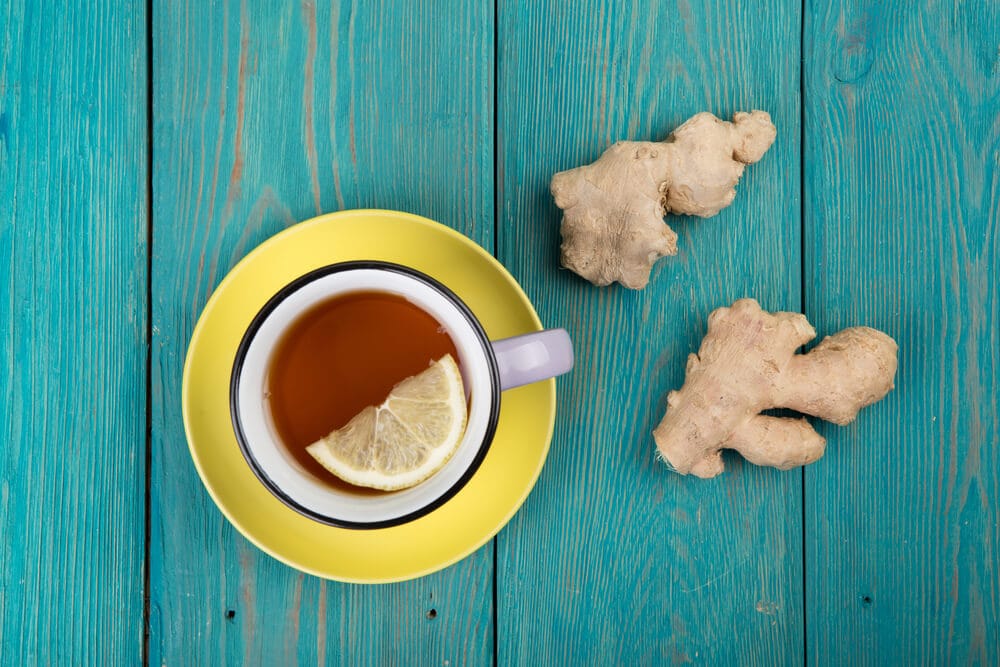
Ginger belongs to the same family as turmeric, and it is a popular staple in both herbal remedies and a variety of dishes and beverages. In herbal medicine, it is popular in treatments for anxiety and depression.[4]
What are the Benefits of Ginger?
Popular uses of ginger include alleviating nausea and reducing pain.
What are the Side Effects of Ginger?
Ginger is mostly safe to use with a few exceptions. That being said, some people do report minor problems like gas and heartburn. Some experts further suggest that ginger could interact negatively with blood thinners (think drugs like warfarin). So, people using blood thinners should exercise extra caution.
Does Ginger Tea for Sleep Work?
There’s some data to back up claims that ginger may be effective in combating nausea caused by pregnancy or chemotherapy. There isn’t, though, any hard data to say one way or the other if ginger tea is an effective sleep aid.[5]
Hops
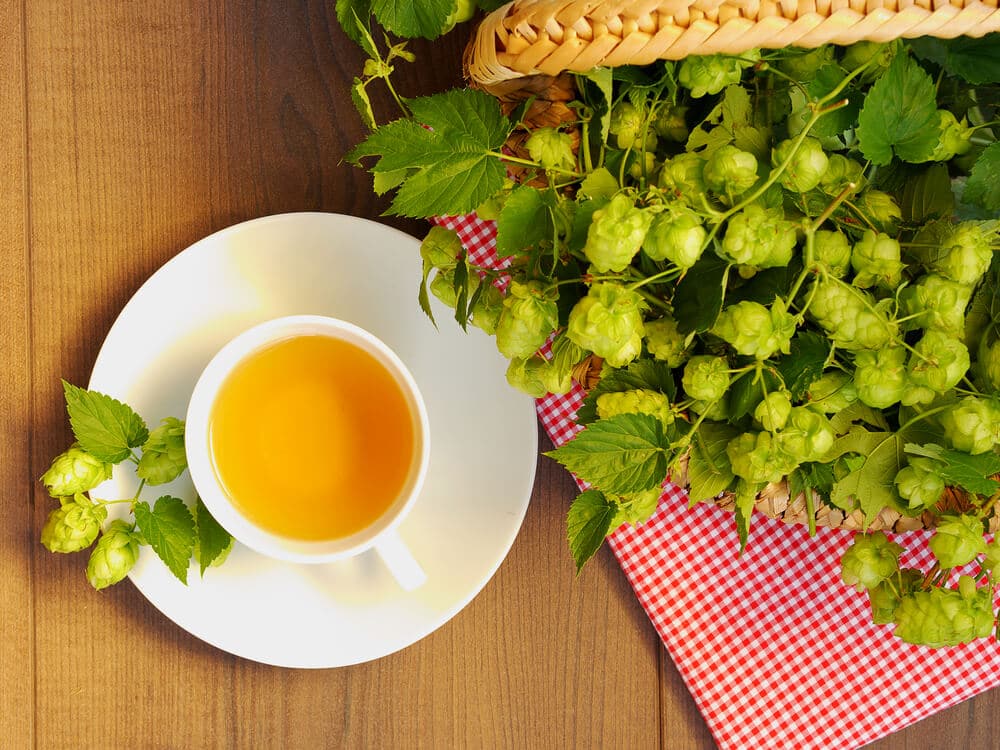
Hops are the flowers of the Humulus luplus plant, a member of the hemp family. (Don’t worry; hops don’t contain THC, so they won’t get anyone high.)
What are the Benefits of Hops?
Many take hops for sedative effects, which may alleviate symptoms of anxiety or sleep issues.
What are the Side Effects of Hops?
Potential side effects of hops include extreme drowsiness and worsening depression. Additionally, those with sensitivities to estrogen should steer clear of these flowers.[6]
Does Hops Tea for Sleep Work?
Hops-derived beverages may work as sleep aids. Specifically, smaller studies suggest that non-alcoholic beer with hops may help those who struggle with sleeping. One small study, for instance, showed that human subjects’ sleep quality improved while sleep latency—how long it takes to fall asleep—decreased.[7] Likewise, another 2012 study showed improved sleep in quails—who have a similar sleep-wake rhythm to humans—after ingesting hops extract.[8]
So, what’s the verdict on hops? Well, larger, more wide-scale studies are necessary to conclude whether hops tea truly is an effective sleep aid. There are promising small-scale studies on the matter, though. These studies suggest that further research into hops tea could prove useful.
Lavender
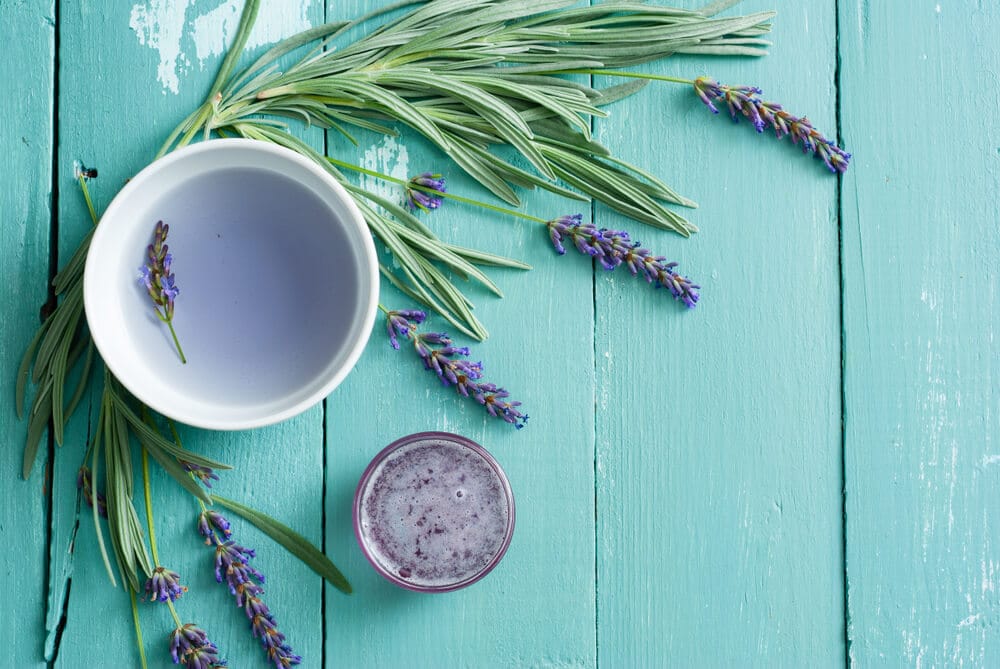
Lavender is actually a genus of plants, Lavandula, which itself is part of the mint family. When most people refer to lavender, though, they are referring to the species Lavandula angustifolia. Also known as English lavender, French lavender, or even common lavender, people derive essential oils, supplements, and teas from this plant.
What are the Benefits of Lavender?
Popular uses for lavender include aromatherapy, stress reduction, pain alleviation, and hair growth.
What are the Side Effects of Lavender?
While lavender tea might be safe for some people to use, it’s generally not safe to ingest lavender oil. In fact, some people may experience negative reactions to lavender oil simply by inhaling its vapors. Others still may experience irritated skin when using it topically.
Does Lavender Tea Work for Sleep?
Possibly, but there’s no hard scientific data to say that it will. Like some other herbal remedies, the purported benefits of lavender are often based on anecdotal evidence. Further, many studies evaluating lavender’s potential sleep-aid benefits were too small or poorly planned and executed to be of much value.[9]
It is worth noting, though, that there is some research suggesting that other forms of supplemental lavender intake may alleviate some symptoms of depression and anxiety.[10] So, for those whose sleep issues are worsened by anxiety and depression, lavender may help.
Lemon Balm
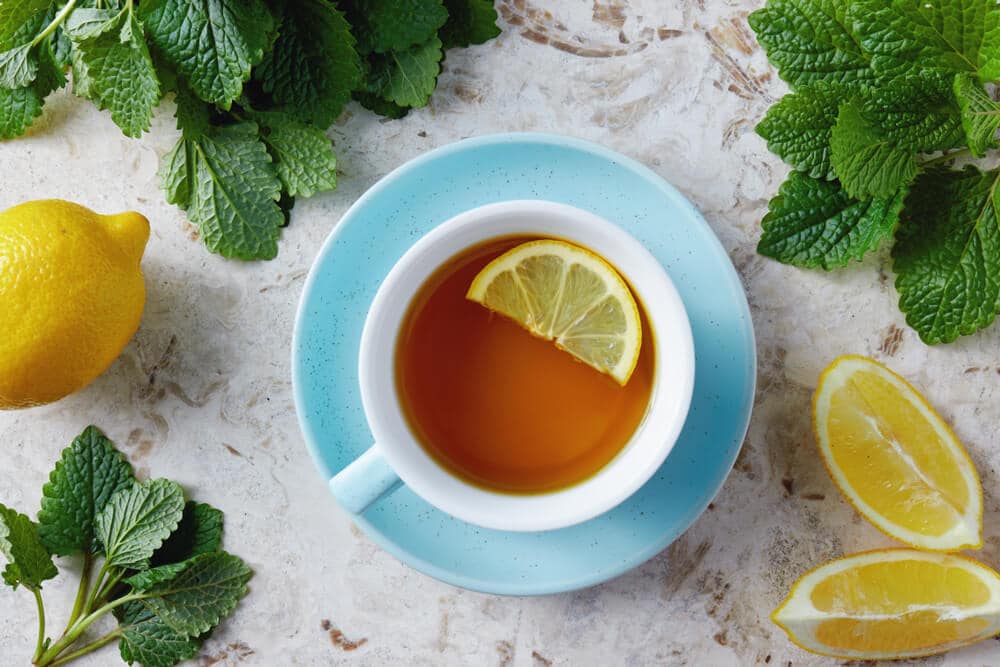
Lemon balm is the common name for Melissa officinalis, a plant in the mint family. Besides use in herbal remedies, dishes, and perfumes, beekeepers often plant this species in the hopes of attracting bees.
What are the Benefits of Lemon Balm?
Popular uses of lemon balm include the alleviation of depression, anxiety, and insomnia-related issues.
What are the Side Effects of Lemon Balm?
Side effects of lemon balm ingestion may include mild nausea or increased appetite.[11]
Does Lemon Balm Tea for Sleep Work?
There are plenty of studies suggesting lemon balm is safe and effective for the treatment of sleep issues, depression, and anxiety.[12,13,14] Further, research indicates that these benefits are not placebos.[15] So, lemon balm tea may be an effective and safe sleep aid, especially for those who suffer from depression and/or anxiety.
Purple Passionflower
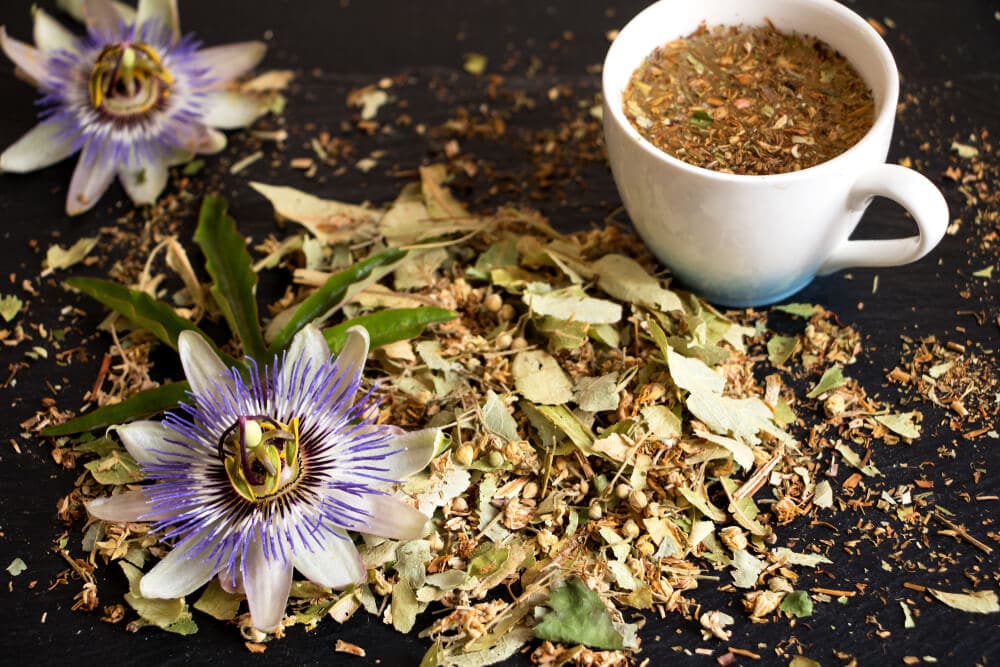
Also known as maypop, purple passionflower is a common name for Passiflora incarnata. This flowering vine commonly grows in the southern United States. Currently, the U.S. Food and Drug Administration recognizes this plant as generally safe for use as food flavoring.[16]
What are the Benefits of Purple Passionflower?
Many take purple passionflower to induce drowsiness or alleviate stress.
What are the Side Effects of Purple Passionflower?
This plant is generally safe to use. However, it may negatively interact with other medications like monoamine oxidase inhibitors (MOAIs).
Does Purple Passionflower Tea for Sleep Work?
Possibly, although current research is mixed. For instance, some research finds that short-term use of this plant in low doses may be effective for aiding rest and reducing stress-related symptoms.[17] Other research, however, believes many studies examining passionflower’s medicinal potential to be flawed.[18]
Skullcap
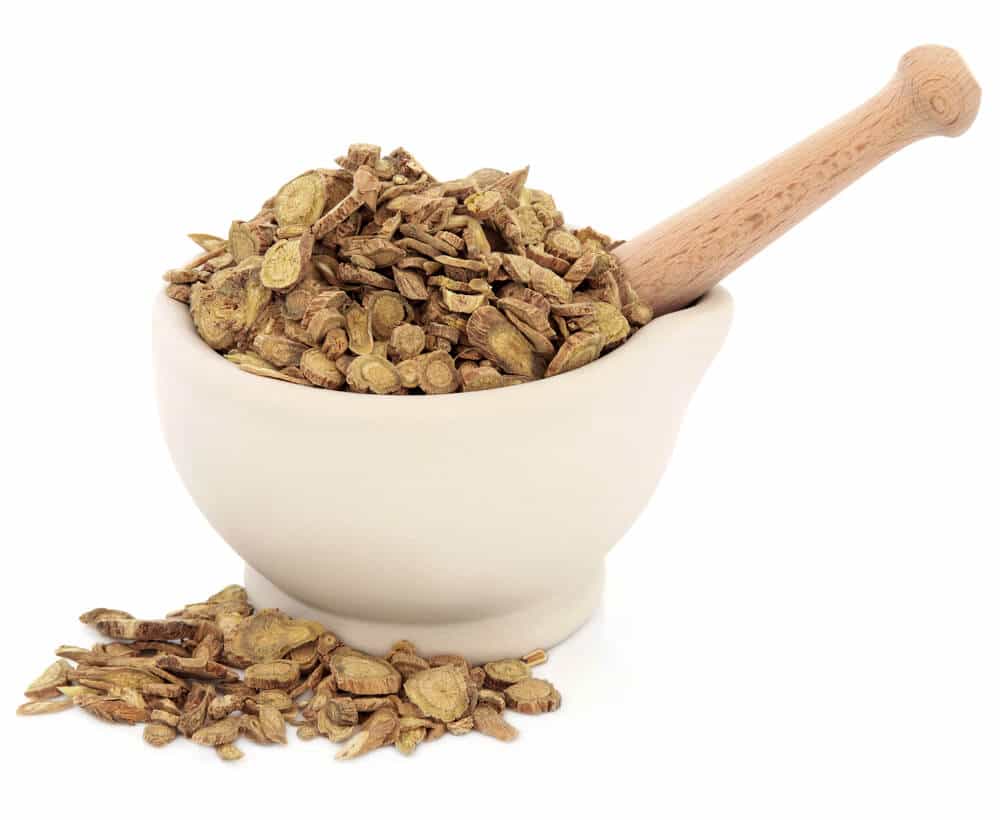
Skullcap is the common name for the flowering genus Scuttellaria. Like lemon balm and lavender, it is part of the mint family. Notably, skullcap contains lots of flavonoids, organic compounds that can provide several health benefits.
What are the Benefits of Skullcap?
Many take skullcap for help with anxiety or insomnia. It also has a history of use in the United States for rabies treatment.
What are the Side Effects of Skullcap?
Current research has not yet reached a consensus on what the potential side effects of skullcap are. Further, experts recommend that pregnant individuals and those with upcoming surgery should avoid this plant.[19]
Does Skullcap Tea for Sleep Work?
Currently, there isn’t much quality research into whether or not skullcap itself is a safe and effective sleep aid. So, does that mean skullcap tea won’t help anyone at all?
Not necessarily.
There is plenty of research showing that many flavonoids found in skullcap have anti-anxiety properties.[20,21] So, this research may be relevant for those whose sleep issues are worsened by anxiety. Although, while some of these flavonoids have anti-anxiety properties, some do not seem to have sedative properties.[22] That implies that these flavonoids might just help those whose sleep suffers from anxiety, not everyone. Again, though, further research into skullcap tea is needed before drawing any hard conclusions.
Sleepytime®️ Tea
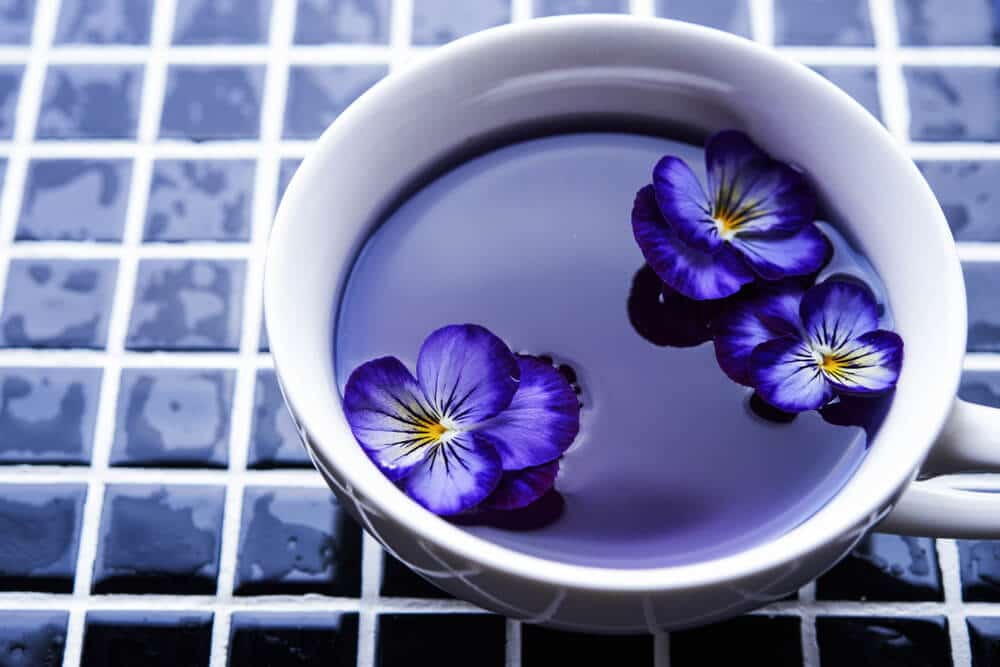
Sleepytime®️ tea is a line of herbal blends from Celestial Seasonings. According to their official website:
- the Classic blend includes chamomile, spearmint, lemongrass, tilia flowers, blackberry leaves, orange blossoms, hawthorn, and rosebuds. Notably, this blend is verified by the Non-GMO Project.
- The Non-GMO verified Lavender blend includes chamomile, spearmint, lemongrass, lavender, hawthorn, blackberry leaves, orange blossoms, and tilia flowers.
- the Decaf Lemon Jasmine blend includes chamomile, decaffeinated green tea, spearmint, lemongrass, natural lemon, and jasmine flavors with other natural flavors, tilia flowers, hawthorn, orange blossoms, ascorbic acid (Vitamin C), and rosebuds.
- the Extra blend is non-GMO and contains chamomile, tilia flowers, valerian, spearmint, lemongrass, and hawthorn.
- the Mint blend contains chamomile, spearmint, lemongrass, peppermint, tilia flowers, natural spearmint flavor with other natural flavors, blackberry leaves, and orange blossoms.
Note that there are more teas in the Sleepytime lineup than what is listed here. To see more Sleepytime teas, you can visit Amazon.com.
What are the Benefits of Sleepytime Tea?
This line of tea is specially designed to fit into people’s nighttime routines, which is why all blends are caffeine-free. Celestial Seasonings makes these blends with herbal ingredients often associated with drowsiness, like chamomile.
What are the Side Effects of Sleepytime Tea?
Besides potential drowsiness, what can someone expect when they sip Sleepytime®️ tea? Well, the answer to that question depends on the blend and someone’s medical history. For example, someone with ragweed allergies might not take well to the chamomile found in these blends. Additionally, someone who experiences dizziness from valerian might encounter similar issues when drinking the Sleepytime Extra®️ blend.
Does Sleepytime Tea for Sleep Work?
Potentially. Notably, some research suggests that herbal blends may be more effective as supplements compared to ingesting a single herb or plant alone.[23]
Valerian
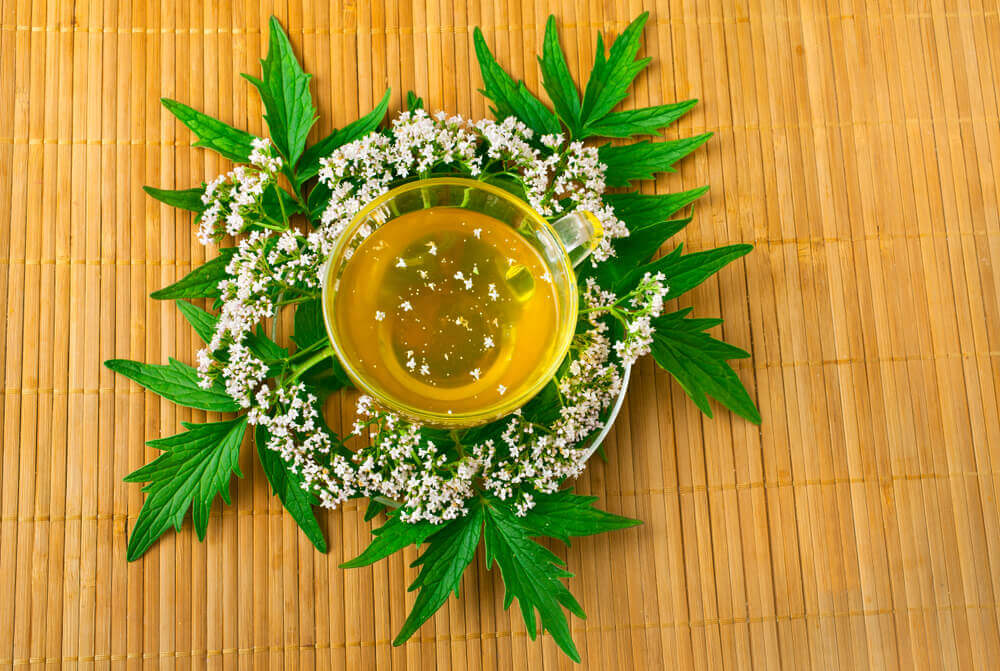
Valeriana officinalis is a flowering plant that also has a long history of use in herbal medicine. In fact, even the Father of Medicine himself, Hippocrates, recognized its potential medicinal uses.
What are the Benefits of Valerian?
Many people use valerian in the hopes that it will help with digestive, menopausal, depression, and anxiety issues, among others.
What are the Side Effects of Valerian?
Some people report issues like dizziness, headaches, or itching after using valerian.[24]
Does Valerian Tea for Sleep Work?
It is possible that valerian can induce drowsiness. In fact, one study noted that valerian root liquid slightly reduced sleep latency.[25] However, this study is small-scaled and dated. Current research on valerian is inconclusive.[26] So, while valerian tea might work, further studies are needed to determine its efficacy as a safe sleep aid.
Final Thoughts
When it comes to the science of herbal teas for sleep, the research isn’t always conclusive. There are still, however, some studies that suggest many herbs commonly found in teas may induce drowsiness or otherwise aid sleep. Not every tea will work best for everyone, though; pregnant individuals especially need to exercise caution when it comes to herbal remedies.
The verdict? Exempting special circumstances and medical conditions, herbal teas are a low-budget, tasty way to potentially improve sleep. However, people who drink these teas should know that these blends might not work for them. Or, if they do work, they might only improve rest modestly.
Terms
- Flavonoids: Organic compounds that may have beneficial properties for humans.
- Sleep Latency: How long it takes someone to fall asleep.
References
[20]Awad, R., Arnason, J.T., Trudeau, V., Bergeron, C., Budzinski, J.W., Foster, B.C., & Merali, Z. (2003). Phytochemical and biological analysis of Skullcap (Scutellaria lateriflora L.): A medicinal plant with anxiolytic properties. Phytomedicine, 10(8):640-649. https://doi.org/10.1078/0944-7113-00374
[12]Cases, J., Ibarra, A., Feuillère, N., Roller, M., & Sukkar, S. G. (2011). Pilot trial of Melissa officinalis L. leaf extract in the treatment of volunteers suffering from mild-to-moderate anxiety disorders and sleep disturbances. Mediterranean journal of nutrition and metabolism, 4(3), 211–218. doi:10.1007/s12349-010-0045-4
[17]European Medicines Agency. (2016). Passiflorae herba. Retrieved from https://www.ema.europa.eu/en/medicines/herbal/passiflorae-herba
[8]Franco, L., Sánchez, C., Bravo, R., Rodriguez, A., Barriga, C., & Juánez, J. (2012). The sedative effects of hops (Humulus lupulus), a component of beer, on the activity/rest rhythm. Acta physiologica hungarica, 99(2). https://doi.org/10.1556/APhysiol.99.2012.2.6
[7]Franco, L., Sánchez, C., Bravo, R., Rodriguez, A., Barriga, C., Romero, E., & Cubero, J. (2012). The sedative effect of non-alcoholic beer in healthy female nurses. PLOS One. https://doi.org/10.1371/journal.pone.0037290
[15]Kennedy, D., Little, W., & Scholey, A. (2004). Attenuation of laboratory-induced stress in humans after acute administration of melissa officinalis (lemon balm). Psychosomatic medicine, 66(4): 607-613. DOI: 10.1097/01.psy.0000132877.72833.71
[14]Kennedy, D.O., Scholey, A.B., Tildesley, N.T.J., Perry, E.K., & Wesnes, K.A. (2002). Modulation of mood and cognitive performance following acute administration of Melissa officinalis (lemon balm). Pharmacology biochemistry and behavior, 72(4): 953-964. https://doi.org/10.1016/S0091-3057(02)00777-3
[25]Leathwood, P.D., & Chauffard, F. (1985). Aqueous extract of valerian reduces latency to fall asleep in man. Planta medica, 51(2): 144-148. Retrieved from https://www.thieme-connect.com/products/ejournals/abstract/10.1055/s-2007-969430
[4]Liu, L., Liu, C., Wang, Y., Wang, P., Li, Y., & Li, B. (2015). Herbal Medicine for Anxiety, Depression and Insomnia. Current neuropharmacology, 13(4), 481–493. doi:10.2174/1570159×1304150831122734
[18]Miroddi, M., Calapai, G., Navarra, M., Minciullo, P.L., Gangemi, S. (2013). Passiflora incarnata L.: Ethnopharmacology, clinical application, safety and evaluation of clinical trials. Journal of ethnopharmacology, 150(3): 791–804. https://doi.org/10.1016/j.jep.2013.09.047
[13]Müller, S.F., & Klement, S. (2006). A combination of valerian and lemon balm is effective in the treatment of restlessness and dyssomnia in children. Phytomedicine, 13(6): 383-387. https://doi.org/10.1016/j.phymed.2006.01.013
[2,23]National Center for Complementary and Integrative Health. (2016). Chamomile. Retrieved from https://nccih.nih.gov/health/chamomile/ataglance.htm
[24]National Center for Complementary and Integrative Health. (2016). Valerian. Retrieved from https://nccih.nih.gov/health/valerian
[9]National Center for Complementary and Integrative Health. (2016). Lavender. Retrieved from https://nccih.nih.gov/health/lavender/ataglance.htm
[22]Schwartz, S. (2008). “Native American psychoactive herbs.” In Psychoactive herbs in veterinary behavior medicine, pp. 95-176. Oxford, U.K.: Blackwell Publishing.
[5]Shurtleff, D., Meister, K., & Law, C. (2019) “Preparing International Travelers.” In CDC Yellow Book. Retrieved from https://wwwnc.cdc.gov/travel/yellowbook/2020/preparing-international-travelers/complementary-and-integrative-health-approaches
[26]Stevinson, C., & Ernst, E. (2000). Valerian for insomnia: a systematic review of randomized clinical trials. Sleep medicine, 1(2): 91-99. DOI: 10.1016/s1389-9457(99)00015-5
[1]Stone, D. (2014). The world’s top drink. Retrieved from https://www.nationalgeographic.com/culture/onward/2014/04/28/the-worlds-top-drink/
[16]U.S. Food and Drug Administration. (2019). Food additive status list. Retrieved from https://www.fda.gov/food/food-additives-petitions/food-additive-status-list#ftnP
[3]U.S. National Library of Medicine. (2019). Roman chamomile. Retrieved from https://medlineplus.gov/druginfo/natural/752.html
[6]WebMD. (n.d.) Hops. Retrieved from https://www.webmd.com/vitamins/ai/ingredientmono-856/hops
[10]WebMD. (n.d.) Lavender. Retrieved from https://www.webmd.com/vitamins/ai/ingredientmono-838/lavender
[11]WebMD. (n.d.). Lemon balm. Retrieved from https://www.webmd.com/vitamins/ai/ingredientmono-437/lemon-balm
[19]WebMD. (n.d.). Skullcap. Retrieved from https://www.webmd.com/vitamins/ai/ingredientmono-986/skullcap
[21]Wolfson, P., & Hoffman, D.L. (2003). An investigation into the efficacy of Scutellaria lateriflora in healthy volunteers. Alternative therapies in health and medicine, 9(2): 74-78. PMID: 12652886
Disclaimers
This article is not to replace the advice of a licensed professional. Allergic reactions, drug interactions, and other reactions to the mentioned plants above may occur. Always talk to a doctor before introducing anything new to a diet.
